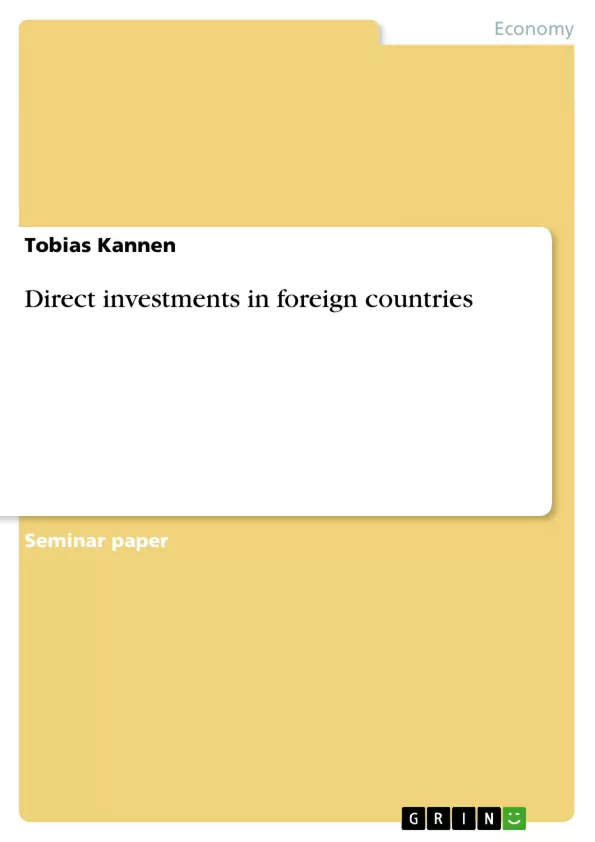In the 20th century, global competition and entering in foreign markets are not only opportunities for companies which want to improve their business position. As an example one study indentified 136 U.S. Industries – including automobiles, accounting services, entertainment, consumer electronics, and publishing – that will have to compete on a global basis or disappear. There are different ways in which to enter in a foreign market: Exporting, licensing, franchising, entering into a joint venture with a host country company, and setting up a wholly owned subsidary in the host country. This term paper will concentrate on the last two ways, which are called direct investments, which means that the company is involved in managing the productive assets, which distinguishes it from other entry strategies that permit less managerial control.
It seems to be clear that, in general, competing in foreign markets where there are significiant cross-country variations in cultural, demographic, and market conditions, poses a much bigger strategy-making challenge than just competing at home. But where exactly are the main difficulties and how to solve at least the biggest problems?
It sounds funny when we hear some mistakes of big companies like Wal-Mart, which has encountered difficulties in translating the warehouse club concept to Hong Kong. As a young accountant eyed a 4-pound jar of peanut butter, he said. “The price is right, but where should I put it?”. Or when Coors Beer tried to translate a slogan with the phrase “Turn It Loose” into Spanish and it came out as “Drink Coors and Get Diarrhea”. Although these examples may seem humorous, these kind of problems are serious for managers trying to operate in a competitive global environment. The different problems companies have when they make direct investments abroad and how to solve them will be theme of this term paper.
Inhaltsverzeichnis (Table of Contents)
- Introduction
- The topic
- Procedure
- The reasons of companies to invest abroad
- New customers
- Cost reductions
- Difficulties in foreign countries
- Economic sector
- Legal-political sector
- Sociocultural sector
- Development programmes
- Investment insurance through the companies of the Berne Union
- Investment support offered by countries to encourage overseas investors
- Summary
Zielsetzung und Themenschwerpunkte (Objectives and Key Themes)
This term paper explores the rationale behind companies' expansion into foreign markets, particularly focusing on direct investments and the complexities associated with them. It aims to understand the reasons behind companies' decisions to invest abroad, identify the challenges they face in different economic, legal-political, and sociocultural environments, and explore potential solutions through investment guarantees and development programs.
- The motivations behind companies investing in foreign countries
- The challenges faced by companies when making direct investments abroad
- The impact of economic, legal-political, and sociocultural factors on foreign investments
- Potential solutions for overcoming challenges through investment guarantees and development programs
- The importance of understanding and navigating cross-country variations in market conditions
Zusammenfassung der Kapitel (Chapter Summaries)
- Introduction: This chapter sets the stage for the term paper by introducing the topic of direct investments in foreign countries. It highlights the growing importance of global competition and the various entry strategies available to companies, emphasizing the focus on direct investments, which involve managerial control over productive assets.
- The reasons of companies to invest abroad: This chapter examines the primary motivations behind companies expanding into foreign markets. It focuses on two key drivers: gaining access to new customers in emerging markets and reducing costs through factors like lower labor costs in specific regions.
- Difficulties in foreign countries: This chapter delves into the challenges companies encounter when investing in foreign countries. It analyzes three crucial sectors that pose significant difficulties: the economic, legal-political, and sociocultural sectors, underscoring the need for careful consideration of these factors when making investment decisions.
- Development programmes: This chapter explores potential solutions to mitigate the challenges associated with foreign investments. It examines two approaches: investment insurance through the Berne Union and investment support programs offered by countries to attract foreign direct investors.
Schlüsselwörter (Keywords)
This term paper focuses on direct investments, foreign markets, global competition, economic, legal-political, and sociocultural factors, investment guarantees, development programs, emerging markets, location economies, and cross-country variations in market conditions. The paper examines the motivations behind companies' decisions to invest abroad, the challenges they face in different contexts, and potential solutions for mitigating those challenges.
Frequently Asked Questions
Why do companies decide to invest in foreign countries?
Main motivations include gaining access to new customers in emerging markets and achieving cost reductions, such as lower labor or production costs.
What are the biggest challenges for direct investments abroad?
Companies face difficulties in the economic, legal-political, and sociocultural sectors, including cross-country variations in market conditions.
What is the difference between direct investment and exporting?
Direct investment involves managing productive assets and maintaining managerial control, whereas exporting or licensing permits less direct control over operations.
How can sociocultural differences impact business success?
Misunderstandings in language, culture, or consumer habits (like Wal-Mart in Hong Kong) can lead to serious operational failures and financial losses.
What role does the Berne Union play?
The Berne Union companies offer investment insurance to protect businesses against political and economic risks when investing in foreign markets.
- Citar trabajo
- Tobias Kannen (Autor), 2004, Direct investments in foreign countries, Múnich, GRIN Verlag, https://www.grin.com/document/24050



